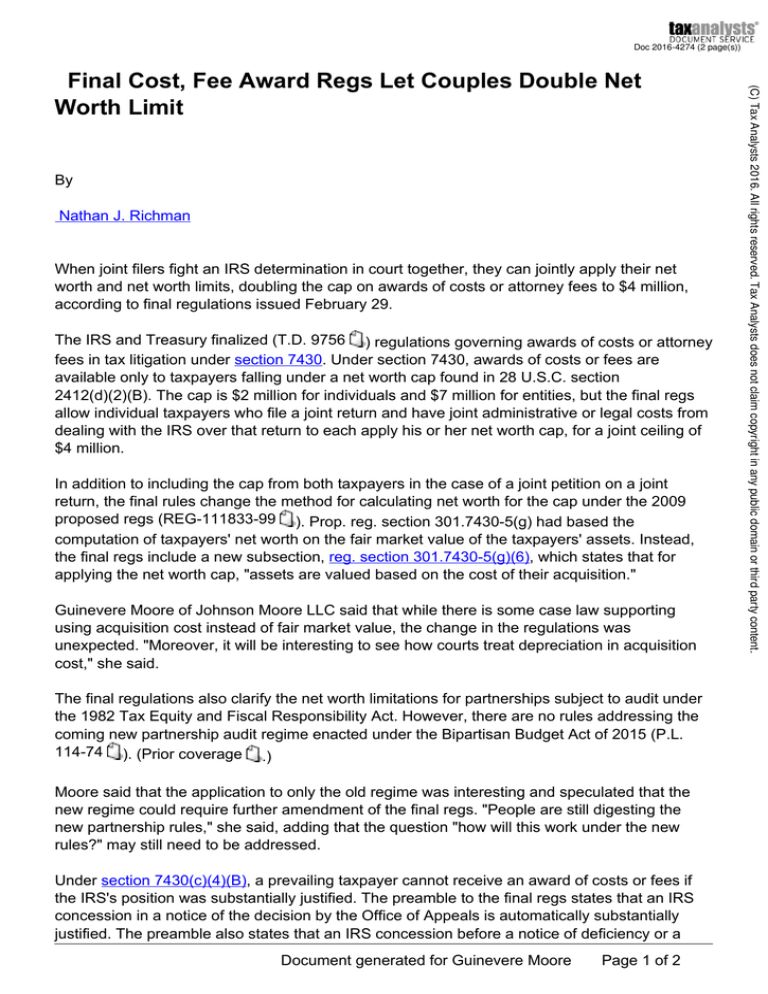
Doc 2016-4274 (2 page(s))
By
Nathan J. Richman
When joint filers fight an IRS determination in court together, they can jointly apply their net
worth and net worth limits, doubling the cap on awards of costs or attorney fees to $4 million,
according to final regulations issued February 29.
The IRS and Treasury finalized (T.D. 9756 ) regulations governing awards of costs or attorney
fees in tax litigation under section 7430. Under section 7430, awards of costs or fees are
available only to taxpayers falling under a net worth cap found in 28 U.S.C. section
2412(d)(2)(B). The cap is $2 million for individuals and $7 million for entities, but the final regs
allow individual taxpayers who file a joint return and have joint administrative or legal costs from
dealing with the IRS over that return to each apply his or her net worth cap, for a joint ceiling of
$4 million.
In addition to including the cap from both taxpayers in the case of a joint petition on a joint
return, the final rules change the method for calculating net worth for the cap under the 2009
proposed regs (REG-111833-99 ). Prop. reg. section 301.7430-5(g) had based the
computation of taxpayers' net worth on the fair market value of the taxpayers' assets. Instead,
the final regs include a new subsection, reg. section 301.7430-5(g)(6), which states that for
applying the net worth cap, "assets are valued based on the cost of their acquisition."
Guinevere Moore of Johnson Moore LLC said that while there is some case law supporting
using acquisition cost instead of fair market value, the change in the regulations was
unexpected. "Moreover, it will be interesting to see how courts treat depreciation in acquisition
cost," she said.
The final regulations also clarify the net worth limitations for partnerships subject to audit under
the 1982 Tax Equity and Fiscal Responsibility Act. However, there are no rules addressing the
coming new partnership audit regime enacted under the Bipartisan Budget Act of 2015 (P.L.
114-74 ). (Prior coverage .)
Moore said that the application to only the old regime was interesting and speculated that the
new regime could require further amendment of the final regs. "People are still digesting the
new partnership rules," she said, adding that the question "how will this work under the new
rules?" may still need to be addressed.
Under section 7430(c)(4)(B), a prevailing taxpayer cannot receive an award of costs or fees if
the IRS's position was substantially justified. The preamble to the final regs states that an IRS
concession in a notice of the decision by the Office of Appeals is automatically substantially
justified. The preamble also states that an IRS concession before a notice of deficiency or a
Document generated for Guinevere Moore
Page 1 of 2
(C) Tax Analysts 2016. All rights reserved. Tax Analysts does not claim copyright in any public domain or third party content.
Final Cost, Fee Award Regs Let Couples Double Net
Worth Limit
Doc 2016-4274 (2 page(s))
T. Keith Fogg of Villanova University School of Law said that the concession issue is notable in
light of recent litigation involving qualified offers. For example, in Knudsen v. Commissioner, No.
13-72077 (9th Cir. 2015) , the Ninth Circuit overruled the Tax Court and found that a unilateral
concession was not a settlement under the qualified offer rules of section 7430(c)(4)(E), and
awarded attorney fees. (Prior coverage .)
A qualified offer allows a taxpayer to receive a cost or fee award as the prevailing party as long
as the total outcome is less than what the taxpayer offered the government to settle. A different
settlement prevents the application of the qualified offer rules.
The final regs also clarified the computation of attorney fees awardable to taxpayers with pro
bono representation, and the IRS accompanied the release with Rev. Proc. 2016-17, 2016-11
IRB 1 , which includes the rates for pro bono assistance from representatives who do not
have hourly rates, such as low-income tax clinic employees and students authorized to appear
before the IRS or Tax Court. The final regs removed the income limit, other than the general net
worth limit, for fee awards for pro bono services.
Rev. Proc. 2016-17 sets the hourly rate at $125 for pro bono services from a representative,
other than a student or paralegal, who does not have an hourly rate, and that amount
corresponds with the general maximum hourly rate under section 7430(c)(1)(B)(iii). Above that
rate, any representative other than a paralegal or student must justify the rate based on the
difficulty of the case or regional availability of tax expertise.
A January 2010 comment letter
submitted to the IRS on the proposed regulations suggested
that pro bono services provided by law students should be compensated at 40 percent of the
normal rate. Rev. Proc. 2016-17 allows 35 percent of the statutory rate for student
representation and for paralegal assistance provided to non-student pro bono assistance.
Moore said that while these guidelines did not give everything asked for, "they did clarify what
you can get, which I think is a big step in the right direction." The clinics invest a lot of money
training students, and both the clinics and students invest a large amount of time, she said.
Fogg said, "I do not necessarily agree with the conclusion in the revenue procedure that student
value is only 35 percent, but it is good to have a definite standard."
Document generated for Guinevere Moore
Powered by TCPDF (www.tcpdf.org)
Page 2 of 2
(C) Tax Analysts 2016. All rights reserved. Tax Analysts does not claim copyright in any public domain or third party content.
notice of an Appeals decision means that the IRS has not even taken a position, so no award is
available.
